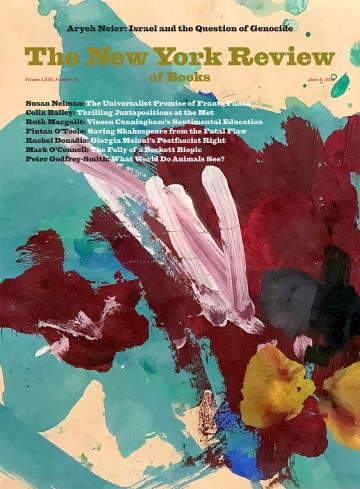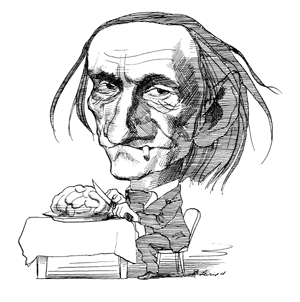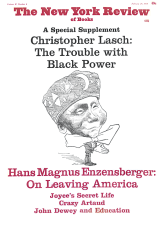Antonin Artaud is known in the English-speaking world almost exclusively as an influence on the theater. He was the inventor of the term “Theater of Cruelty,” which has become a catchword in recent years, especially since the presentation of the Artaud-inspired spectacle, Marat-Sade, written by Peter Weiss and staged by Peter Brook. It is fashionable to refer with respect to his collection of essays on the theater, Le théâtre et son double, which fills most of Volume IV of the complete works, now in process of publication by Gallimard. No doubt his name will always have a place in the history of the drama, after those of Gordon Craig, Stanislavsky, and Jacques Copeau, and will remain associated with a certain theatrical tendency that I shall try to define in a moment. But in France his position extends beyond the theater, and indeed beyond any literary genre. Although he seems to have written incessantly in a sort of violent poetic prose which he scattered in all directions, his actual compositions have always been less well known than his personality. His prestige in literary circles depends in the first place on the fact that he was an abnormal individual, totally committed to the expression or exploration of his abnormality and quite oblivious of any of the requirements of ordinary living.
He was, in fact, mentally deranged, with periods of certifiable madness. He lived with one foot—and sometimes both feet—in the world of insanity and drug-taking, from which he would emerge at intervals to make blistering attacks on all forms of orthodoxy—bourgeois, Catholic, theatrical, or medical. He was, then, an extreme case of the poète maudit: suffering from a chronic disease like Baudelaire, afflicted with a chronic vice like Verlaine or Alfred Jarry, intolerant of any restrictions like Rimbaud, and passing backward and forward over the threshold of madness like Gérard de Nerval or Raymond Roussel. He was one of those almost totally alienated people who live life as if it were a perpetual suicide. Such people can have a hypnotic aura and, in Artaud’s case, the spell seems to have been strong enough to modify the attitudes of a number of people who came into contact with him. I have heard it said, by someone who knew him, that he sucked weaker personalities into his vortex. On the practical level, apart from one or two trancelike performances as an actor, he was an almost complete failure. His various theatrical ventures never got off the ground or were short-lived. Louis Jouvet, Charles Dullin, and others turned a more or less deaf ear to his frequent badgerings, but he found one defender of note in Jean-Louis Barrault, who appears to have remained faithful to his memory. Since his death in 1948 at the age of fifty-two, Artaud has gradually acquired some of the mystic prestige of Rimbaud or Jarry, and it is hardly too much to say that the three of them now form a Trinity of Alienation.
It is appropriate, I suppose, that the first translated anthology of Artaud’s non-theatrical writings should have been brought out in San Francisco. Mr. Hirschman has selected material from various periods of Artaud’s life and had it rendered into English by translators who are themselves poets. By and large they have managed very well, although the text has rather less meaning in English than in French. Sometimes a phrase or reference has been misunderstood and, of course, there is no way of transferring the exact flavor of obscenities from one language to another.
BUT THE DIFFICULTY with Artaud is that, even when the French has been correctly rendered, the text may remain quite opaque, because even in the original it seems to have no meaning accessible to the normal mind. In all these writings, whether they are “poems” composed to relieve his feelings, or “essays” on comparable sufferers such as Van Gogh, or letters of explanation to his doctors or to public figures such as Jacques Rivière, what Artaud is concerned with is the description of his mental states and the excruciating suffering they involved. Now these states relate to a definite illness, which began in his youth in Marseilles before he appeared on the Parisian literary scene, and about the origins of which little or nothing is known. He himself was always secretive about his early life and, to the best of my knowledge, no biography of him has yet been written. What is certain, because he repeats the fact again and again, is that his disability took the form of nightmarish experiences, in which he felt words slipping from his grasp, even as he tried to use them. Paradoxically enough, he is endlessly eloquent about this incipient aphasia.
His linguistic obsession may be linked with his views on the drama, just as his mental sufferings may be the explanation of his recourse to drugs. He was violently opposed to mere talk in the theater and advocated ritualistic performances, in which bodily movement, cries, and chanting would be fused into a total representation of the tragic view of life. In other words, although he was in no sense an orthodox religious believer, he wished to reverse the whole history of the drama as it had evolved over the last few centuries. For him, secularization and commercialism were anathema, and he wished to restore the theater to its original status of “mystery,” in which language would have a secondary place and, in any case, would never be intellectual but always incantatory. It is easy to see how this concept of the theater fits in with the doctrines of the various other theatrical reformers of the last fifty years or more. Looking back over the theatrical innovations that have occurred since the final phase of the nineteenth century, we can say that, as the churches have lost their dramatic force, the avant-garde theater has tried to cater for the religious sense by becoming ever more intense and symbolical. The Marat-Sade spectacle was, in fact, not so much a play as a rather splendid Luciferian anti-service, expressing generalized metaphysical revolt.
Advertisement
A SIMILAR ATTEMPT to go beyond the boundaries of rational statement into the mysteries of the transcendent has also been characteristic of the history of poetry, at least since the middle of the last century. In the Twenties and Thirties of this century, it was the mainspring of the Surrealist Movement, with which Artaud was associated for a short time, and it is probably the chief cause of the undecipherability of vast quantities of contemporary verse. It is now a hundred years since Mallarmé and Rimbaud, in their desperate search for a metaphysical absolute to replace their lost religious faith, relaunched hermeticism as a literary mode, and one might have expected the fashion of poetic obscurity to have receded a little; but it is still the case, I think, that most West European and American poets, even when not insane, would rather be though incomprehensible than too lucid. Their preference is respectable enough in one sense: language still remains the great, central, unsolved problem of human functioning, and those confident people who cannot see the problem and who think that words have “definite” meanings or that it is possible to “say what one thinks” are living in a fool’s paradise. Language itself is just as mysterious as the world it purports to explain. The general truth in the madman’s experience, when he feels that words are crumbling in his mouth as he uses them, is that the sanest person can look over the brink of common sense into an Existentialist abyss of unknowing, as soon as he tries to stop the movement of language in his mind in order to understand it. No such understanding has been possible so far, and perhaps never will be. Therefore, we all have to take language on trust, and part of the function of good poetry is to show over what a quagmire of uncertainties and ambiguities it must inevitably operate, even when making its most telling statements.
Having said this, I wish I could go on to agree with Artaud’s admirers that his poetry is something significantly greater than a flux of words coming from a diseased brain. The most I can feel is that, in his earlier writings at least, he manages to give very graphic and moving descriptions of pathological states which are still within the reach of sanity, just as certain crises in the sane man’s mind may be within the reach of madness, e.g.:
Corrosive sensation in the limbs, muscles as if twisted, then laid open; brittle feeling of being made of glass; wincing and cringing at any move or sound. Unconscious incoherence of steps, of gestures, of movements. Willpower constantly inhibited in even the simplest gestures,
renunciation of simple gestures, overwhelming and CENTRAL fatigue, sort of a dark horse fatigue running for something or other. Body motions run haywire in sort of death exhaustion, mind fatigued at simplest muscular tension like gesture of grasping—unconsciously clinging to something,
holding it together by constant will power.
Or again,
…it is a matter of an actual sickness and not a phenomenon of the age, of a sickness which is related to the essence of the human being and his central possibilities of expression and which is involved in an entire life.
A sickness that affects the soul in its deepest reality and that infects its manifestations. The poison of being. A veritable paralysis. A sickness that deprives you of speech, of memory, that uproots your thinking.
These last words, written in 1924, seem to be a clear admission of the particular nature of his disability. In some of the later texts, he changes his ground and adopts the view that his madness, and that of some other deranged artists such as Van Gogh, is a symptom of the sickness of society:
Advertisement
And what is a genuine lunatic? He is a man who prefers to go mad, in the social sense of the word, rather than forfeit a certain higher idea of human honor.
That’s how society strangled all those it wanted to get rid of, or wanted to protect itself from, and put them in asylums, because they refused to be accomplices to a kind of lofty swill.
But this attitude is never substantiated, and he has little or nothing to say about society as a whole, or about other people, or indeed about anything except himself. His self-absorption becomes tedious because it is a kind of endless linguistic onanism which often collapses into invented gibberish or becomes a string of incoherent obscenities. Sometimes he damns the spirit and exalts the body; at other times he does the opposite. Eventually, he seems to settle into a mood of paranoiac megalomania, in which he equates a sense of power with sex, e.g.,
I only believe in one thing
that my profound power will not
restore me
but will establish me
myself
Antonin Artaud
so as to know myself, feel myself,
desire myself.
The fact is I have a hunch about
myself and guess
rather than feel myself
because what I feel in me
are the others.
I saw that the world was lost
but one must have time to do one
thing to escape above
all and especially the devil.
The power which will come to me
and sweep everything will
be nothing more
than the sum total of all the shots
fired by me for
9 years, [coups tirés=orgasms?]
in that there must be a mass impor-
tant enough to
pass beyond the mass of being.
Granted that the world is mysterious, language incomprehensible, and common sense inadequate, I still feel that this is not really literature. On the whole, I doubt whether, during the last hundred years, the frontiers of experience have been pushed back further by irrationalists than by rationalists, and in Artaud the poet I can see only a tortured creature with an occasional heart-rending nostalgia for sanity.
This Issue
February 29, 1968




